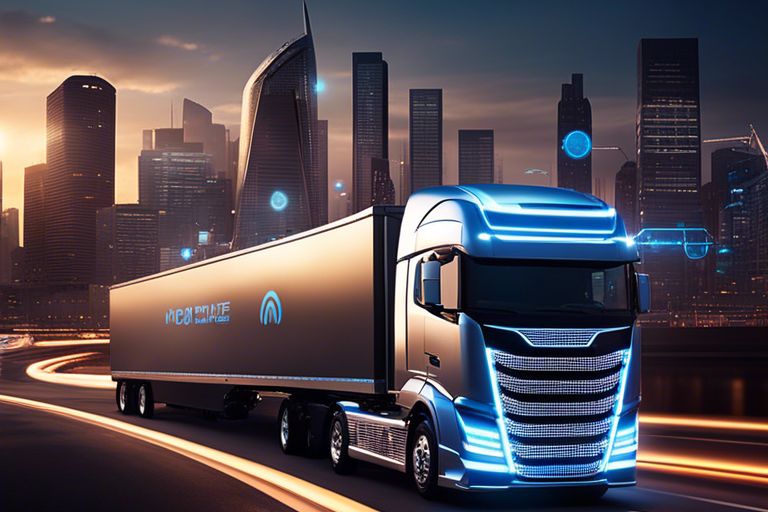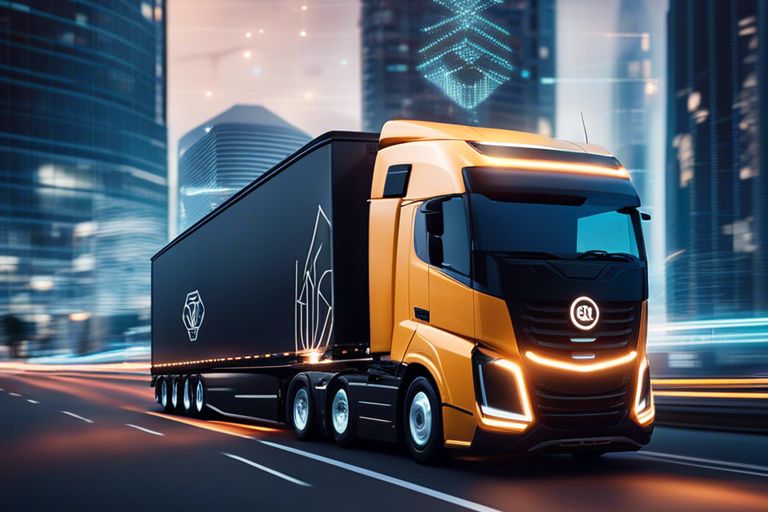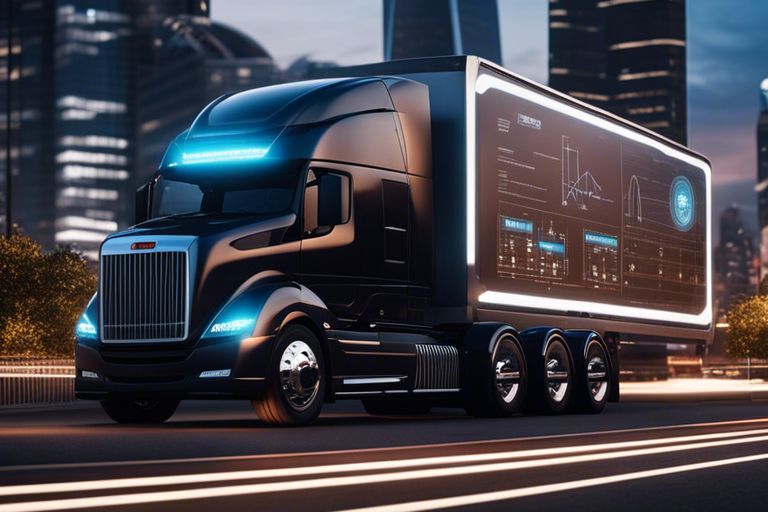Are you ready to revolutionize the way you manage your trucking operations? In today’s fast-paced and highly competitive industry, staying ahead of the curve is crucial to maintaining a profitable and efficient business. With the emergence of artificial intelligence (AI) in dispatch software, you now have the opportunity to streamline your operations, maximize efficiency, and minimize costly errors.
The integration of AI in dispatch software enables you to optimize route planning, reduce fuel consumption, and improve delivery times by utilizing advanced algorithms to analyze complex data sets and make real-time decisions. Additionally, AI can identify potential risks and hazards on the road, leading to a safer and more secure work environment for your drivers. In this blog post, we will explore the various benefits and capabilities of smart trucking technology, and how it can transform the way you manage your fleet.
Key Takeaways:
- Improved Efficiency: Harnessing artificial intelligence in dispatch software allows for more efficient route planning, load optimization, and real-time tracking, ultimately leading to cost savings and improved customer service.
- Enhanced Decision-Making: AI-powered dispatch software provides valuable insights and predictions, enabling better decision-making for dispatchers and fleet managers, leading to more proactive and data-driven operations.
- Automation and Integration: By leveraging AI in dispatch software, manual tasks can be automated, leading to seamless integration with other systems and improved overall workflow, ultimately streamlining operations and reducing errors.
 1. AI dispatch software increases efficiency and reduces human error.
1. AI dispatch software increases efficiency and reduces human error.
2. Real-time data analysis for better decision-making and route optimization.
3. Predictive maintenance scheduling to reduce downtime and maintenance costs.
4. Enhanced safety features with AI monitoring driver behavior and road conditions.
5. Improved customer service with real-time updates on delivery status.
6. Integration with other systems for seamless operations and data exchange.
Understanding AI and Its Capabilities
Some people may think of artificial intelligence (AI) as a concept from science fiction, but in reality, it has already become an integral part of our everyday lives. AI is a powerful tool that has the potential to revolutionize the way industries operate, and the trucking industry is no exception. By harnessing AI in dispatch software, you can streamline operations, improve efficiency, and make better data-driven decisions.
Basics of Artificial Intelligence
At its core, AI is the simulation of human intelligence processes by machines, especially computer systems. It encompasses a wide range of capabilities, including problem-solving, pattern recognition, and natural language understanding. In the context of dispatch software, AI can automate routine tasks, analyze complex data sets, and provide valuable insights that can help you optimize your trucking operations.
Machine Learning and Data Analysis
Machine learning is a subset of AI that focuses on the development of algorithms that can learn from and make predictions based on data. By leveraging machine learning in dispatch software, you can train the system to recognize patterns in your operations, identify potential bottlenecks, and even predict future demand. This can enable you to make more informed decisions and stay ahead of the competition.
AI Innovations That Are Changing Industries
AI has already made a significant impact across various industries, from healthcare to finance, and it is now poised to transform the trucking industry. Innovations such as autonomous vehicles, predictive maintenance, and route optimization are revolutionizing the way goods are transported. By embracing these AI-driven advancements, you can improve safety, reduce costs, and deliver a more reliable service to your customers.

The Core Components of AI-Enabled Dispatch Software
For smart trucking operations, harnessing the power of artificial intelligence (AI) in your dispatch software is crucial. AI-enabled dispatch software goes beyond traditional systems by incorporating advanced technologies to streamline processes, improve efficiency, and enhance decision-making. The core components of AI-enabled dispatch software work together to provide real-time insights and actionable data, enabling you to optimize fleet operations and stay ahead of the competition.
Real-Time Vehicle Tracking
Real-time vehicle tracking is a pivotal feature of AI-enabled dispatch software. By incorporating GPS and telematics technology, the software allows you to track the precise location of your vehicles at any given time. This not only enables you to improve the accuracy of delivery estimates but also enhances the security of your assets. Real-time vehicle tracking also provides valuable data on driver behavior, fuel consumption, and route efficiency, empowering you to make informed decisions to optimize operations and reduce costs.
Automated Dispatching
Automated dispatching is another critical component of AI-enabled software. By leveraging AI algorithms, the software can intelligently assign and schedule jobs to the most appropriate drivers and vehicles based on various factors such as location, availability, and capacity. Automated dispatching not only speeds up the dispatch process but also minimizes the risk of human error and ensures that the most efficient use of your resources is achieved. By automating routine tasks, you can focus on strategic planning and decision-making to drive your business forward.
Dynamic Route Optimization
Dynamic route optimization is a game-changer for trucking companies. AI-enabled dispatch software can analyze real-time traffic, weather conditions, and road closures to dynamically adjust routes and schedules. This not only reduces delivery times but also minimizes fuel consumption and wear and tear on vehicles. By optimizing routes in real-time, you can maximize efficiency, reduce environmental impact, and ultimately enhance customer satisfaction. Dynamic route optimization also allows you to adapt quickly to unforeseen circumstances, such as traffic jams or last-minute delivery changes, ensuring that your operations remain agile and responsive.
Predictive Maintenance Scheduling
Predictive maintenance scheduling is a proactive approach to minimizing downtime and extending the lifespan of your vehicles. AI-enabled dispatch software can analyze data from vehicle sensors and historical maintenance records to predict when maintenance is needed. By implementing predictive maintenance scheduling, you can avoid costly breakdowns and repairs, ultimately saving time and money. Additionally, by keeping your fleet in optimal condition, you can ensure reliable and efficient operations, reducing the risk of unplanned disruptions.
Fleet Management and Efficiency
AI-enabled dispatch software provides comprehensive fleet management tools to enhance overall efficiency. From monitoring fuel consumption and driver performance to analyzing vehicle utilization and maintenance costs, the software offers valuable insights into your fleet’s performance. By leveraging these insights, you can identify opportunities for improvement, optimize resource allocation, and ultimately drive greater efficiency across your operations. The ability to make data-driven decisions based on real-time information is essential for staying competitive in the ever-evolving trucking industry.
The Impact of AI on Fleet Operations
Now, let’s take a look at the significant impact that Artificial Intelligence (AI) has on fleet operations. With the integration of AI into dispatch software, you can expect a transformation in the way your fleet operates, resulting in enhanced logistics efficiency, reduced operational costs, improved safety and compliance, as well as fuel consumption and emission reductions.
Enhancing Logistics Efficiency
AI-powered dispatch software can optimize route planning and scheduling, leading to more efficient and timely deliveries. By analyzing vast amounts of data and taking into account factors such as traffic patterns, weather conditions, and delivery windows, AI can help you streamline your operations and minimize delays. This means that you can increase the number of deliveries you make in a day, ultimately improving customer satisfaction and maximizing your fleet’s productivity.
Reducing Operational Costs
One of the most significant benefits of employing AI in dispatch software is the potential for reducing operational costs. By automating repetitive tasks and optimizing routes, you can minimize fuel consumption, vehicle wear and tear, and labor costs. Additionally, AI can assist in predicting maintenance needs, allowing you to schedule timely preventive maintenance and avoid costly breakdowns. This ultimately leads to a more cost-effective and sustainable operation for your fleet.
Improving Safety and Compliance
Integrating AI into dispatch software can significantly enhance safety and compliance within your fleet. AI algorithms can analyze driver behavior and identify patterns that may indicate risky driving practices, prompting you to take proactive measures to address them. Furthermore, AI can assist in ensuring compliance with industry regulations and standards, helping you to avoid potential penalties and maintain a sterling reputation for safety within your operations.
Fuel Consumption and Emission Reductions
By leveraging AI in dispatch software, you can effectively monitor and optimize fuel consumption, leading to substantial cost savings and environmental benefits. Through advanced data analysis, AI can identify inefficiencies in driving behavior and vehicle performance, allowing you to make targeted improvements that reduce fuel consumption and emissions. This not only positively impacts your bottom line but also contributes to a more sustainable and environmentally responsible operation.
The integration of AI into dispatch software offers numerous advantages, from enhancing logistics efficiency to reducing operational costs and improving safety and compliance. It’s clear that AI has the potential to revolutionize the way fleet operations are managed, making it an essential tool for modern trucking companies looking to stay ahead in a competitive industry. Embracing AI technology is crucial for staying competitive and ensuring the long-term success of your fleet.
Case Studies: AI Transformations in Trucking
Unlike the traditional methods of dispatching trucks, artificial intelligence (AI) has revolutionized the trucking industry by streamlining operations, optimizing routes, and improving overall efficiency. Below are some case studies that highlight the impact of AI on the trucking industry:
- Company A: Implemented AI-powered dispatch software and saw a 12% reduction in fuel consumption and a 15% increase in on-time deliveries. (Five ways AI is transforming the trucking industry)
- Company B: Utilized AI algorithms for load optimization and experienced a 20% decrease in empty miles, resulting in significant cost savings.
- Company C: Integrated AI-based predictive maintenance, leading to a 30% reduction in maintenance costs and a 25% increase in fleet uptime.
Small to Medium-Sized Trucking Companies
For small to medium-sized trucking companies, the adoption of AI in dispatch software has been transformative. By leveraging AI algorithms for load optimization and route planning, these companies have been able to significantly reduce operational costs and improve their overall efficiency. Additionally, AI has enabled them to better compete with larger fleets by offering more competitive pricing and reliable delivery schedules.
Large Fleet Implementations
Large trucking fleets have seen substantial benefits from AI-powered dispatch software. With the ability to process vast amounts of data in real-time, AI has empowered these fleets to optimize their operations, minimize empty miles, and reduce fuel consumption. Furthermore, AI has enabled them to enhance their customer service by providing accurate delivery ETAs and proactively addressing potential issues.
Comparative Analysis of Pre and Post AI Adoption
The adoption of AI in dispatch software has led to a stark contrast in the operational efficiencies of trucking companies. Pre-AI adoption, companies struggled with inefficient route planning, high fuel costs, and frequent breakdowns. However, post-AI adoption, these companies have witnessed a dramatic improvement in their operational metrics, including reduced fuel consumption, improved on-time deliveries, and decreased maintenance expenses.
| Pre-AI Adoption | Post-AI Adoption |
| High fuel consumption | Reduced fuel consumption by 12% |
| Low on-time deliveries | Improved on-time deliveries by 15% |
| Frequent breakdowns | Reduced maintenance costs by 30% |
Overcoming Challenges in AI Implementation
To fully harness the benefits of artificial intelligence (AI) in dispatch software, you must be aware of the challenges that come with its implementation. According to a study conducted by TCi Transportation, implementing AI in transportation and logistics can be a complex process and presents various hurdles that must be overcome. The Impact of Artificial Intelligence (AI) on Transportation …
Data Privacy and Security Concerns
One of the primary concerns when implementing AI in dispatch software is data privacy and security. With AI systems processing and analyzing vast amounts of sensitive information, ensuring the protection of this data is paramount. You must prioritize implementing strong encryption and access control measures to safeguard your data from potential breaches and unauthorized access. Regular security audits and updates to your AI systems are essential to stay ahead of evolving cybersecurity threats.
Integration with Existing Systems
Integrating AI into your existing dispatch software and systems can be a challenging task. You may encounter compatibility issues and disruptions during the implementation process. It’s crucial to work closely with your IT team and AI software providers to ensure a seamless integration. You must also consider the potential impact on your day-to-day operations and develop a comprehensive plan to minimize any disruptions as you transition to AI-powered dispatch solutions.
Training and Workforce Adaptation
Implementing AI in dispatch software will require your workforce to adapt to new technologies and processes. You must invest in comprehensive training programs to equip your employees with the necessary skills to effectively utilize AI-powered tools. Resistance to change and apprehension about new technologies may arise among your workforce, so it’s essential to address these concerns through clear communication and supportive training initiatives. Emphasize the benefits of AI in optimizing dispatch operations and demonstrate the positive impact it can have on their work.
Cost-Benefit Analysis
When implementing AI in dispatch software, conducting a thorough cost-benefit analysis is crucial. While AI technology offers numerous advantages such as improved efficiency and decision-making, there are significant initial costs associated with its adoption. It’s essential to carefully evaluate the potential return on investment and assess the long-term benefits of AI implementation. Consider factors such as reduced operational costs, enhanced customer satisfaction, and competitive advantages in the market. By conducting a comprehensive cost-benefit analysis, you can make informed decisions about integrating AI into your dispatch operations.
By addressing these challenges and implementing effective strategies, you can successfully harness the power of AI in your dispatch software and optimize your transportation and logistics operations for greater efficiency and competitiveness. Remember to prioritize data privacy and security, ensure seamless integration with existing systems, provide adequate training and support for your workforce, and conduct a thorough cost-benefit analysis to maximize the benefits of AI implementation in your dispatch operations. Embracing AI in dispatch software can revolutionize your transportation and logistics operations, providing you with a competitive edge and driving business growth.
The Future of Trucking with AI
Not so long ago, the concept of using artificial intelligence in the trucking industry seemed like a far-fetched idea. However, with the advancements in technology, AI has integrated seamlessly into various aspects of the trucking business, particularly in dispatch software. To get an in-depth understanding of the role of AI in streamlining truck dispatch operations, you can read more here.
Emerging Trends in AI and Trucking
AI is revolutionizing the trucking industry by introducing emerging trends that have the potential to transform the way fleet management and dispatch operations are handled. These trends include predictive maintenance, which uses AI to forecast potential truck malfunctions before they occur, thus preventing breakdowns and reducing maintenance costs. Additionally, self-learning algorithms are being utilized to analyze and optimize routing and load planning, improving efficiency and reducing fuel consumption.
The Role of Autonomous Vehicles
The integration of AI in trucking has paved the way for autonomous vehicles to become a reality. These vehicles have the potential to significantly reduce human error, increase safety, and improve overall efficiency. With the development of AI-driven autonomous trucks, the industry is on the brink of a groundbreaking transformation that will revolutionize the way goods are transported.
Predictions for AI and the Global Trucking Landscape
Looking ahead, the impact of AI on the global trucking landscape is poised to be significant. With the continued advancement of AI technology, you can expect to see enhanced route optimization, real-time tracking and monitoring, and improved fuel efficiency. Furthermore, the integration of AI in trucking will lead to reduced operational costs and improved customer service, positioning the industry for continued growth and evolution. As AI continues to evolve, the global trucking landscape is set to undergo a profound transformation.

Conclusively
Smart Trucking – Harnessing Artificial Intelligence in Dispatch Software offers a comprehensive overview of the benefits of using AI in the trucking industry. By adopting AI-powered dispatch software, you can streamline operations, optimize routes, and improve overall efficiency. The use of AI can also lead to cost savings and better decision-making, ultimately enhancing your company’s competitiveness in the market.
As the trucking industry continues to evolve, integrating AI into dispatch software is essential for staying ahead of the curve. With the potential to transform the way you manage your fleet and assets, embracing AI technology can pave the way for future success in the trucking industry. By leveraging the power of AI, you can ensure that your dispatch operations are not only smarter but also more efficient, ultimately driving greater productivity and profitability for your business.
FAQ
Q: What is Smart Trucking – Harnessing Artificial Intelligence in Dispatch Software?
A: Smart Trucking is a revolutionary dispatch software that utilizes artificial intelligence to optimize and streamline trucking operations.
Q: How does Smart Trucking use artificial intelligence?
A: Smart Trucking uses artificial intelligence to analyze data patterns, predict potential issues, and recommend the most efficient routes and schedules for trucking operations.
Q: What are the key benefits of using Smart Trucking?
A: The key benefits of using Smart Trucking include improved operational efficiency, reduced fuel costs, minimized downtime, and enhanced customer satisfaction through timely deliveries.
Q: Is Smart Trucking suitable for small and large trucking companies?
A: Yes, Smart Trucking is designed to cater to the needs of both small and large trucking companies, providing scalable solutions to optimize their dispatch operations.
Q: Can Smart Trucking integrate with existing dispatch systems?
A: Yes, Smart Trucking is designed to seamlessly integrate with existing dispatch systems, ensuring a smooth transition and minimal disruption to operations.
Q: How does Smart Trucking ensure data security and privacy?
A: Smart Trucking prioritizes data security and privacy, implementing robust encryption measures, access controls, and regular security updates to safeguard sensitive information.
Q: What kind of customer support does Smart Trucking provide?
A: Smart Trucking offers comprehensive customer support, including training, troubleshooting, and ongoing assistance to ensure that users get the most out of the software. Our support team is available 24/7 to address any queries or issues.